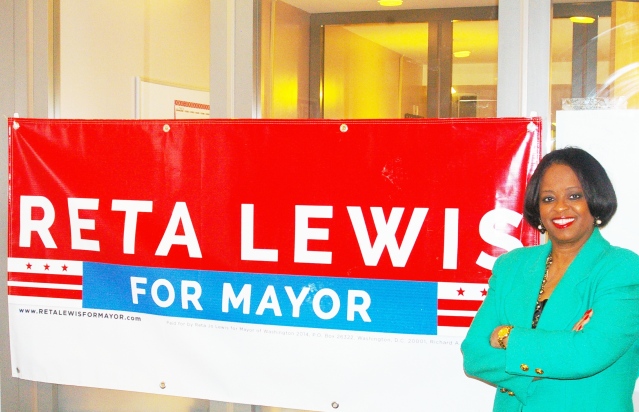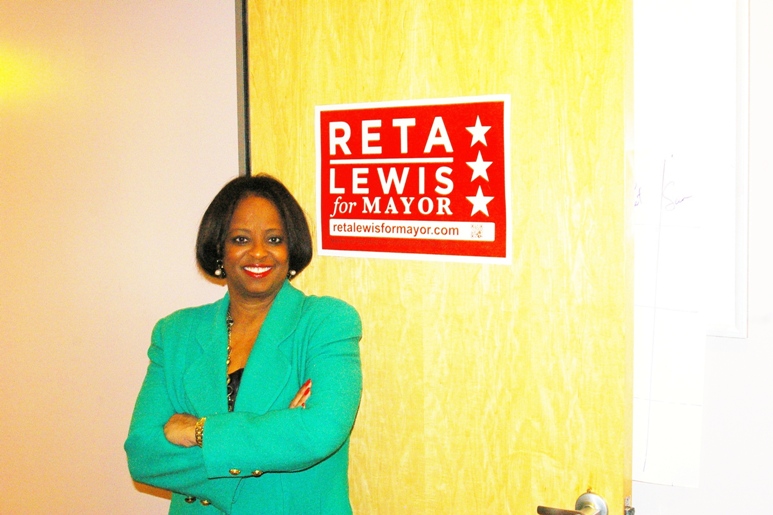 March 23, 2014
March 23, 2014
Ernesto McConnell
Reporter
Metrolink
I wouldn’t dare be the one telling him (Mayor Vince Gray) what to do, because he wouldn’t listen to me, anyway. What he has to listen to, and all of them have to listen to, are the citizens of D.C. It is our voice. It’s the citizen’s voices that have to be heard. Right now, it is a very sad day; it’s very shocking and it’s very disappointing, but it’s also embarrassing. Once again, here we sit in Washington, time and time again, trying to move [forward], and of course we get thrown back to say, “Oh, that’s typical D.C.”
— Reta Jo Lewis, D.C. mayoral candidate
Photos: Ernesto McConnell/DC Spotlight Newspaper
To some, moving from their small hometown into the busy, bustling city of Washington, D.C. may be overwhelming, but not for Reta Jo Lewis. The D.C. mayoral candidate came to the city from Georgia at the age of 22 to attend American University, and has been around ever since. Lewis was born in Statesboro, Georgia in 1953, and since making the move to the District some 30 years ago, Lewis has worked with numerous local and national government agencies. She has held titles and positions that run the gamut in both the private and public sectors. Those include Special Representative for Global Intergovernmental Affairs at the U.S. Department of State, Special Assistant to President Bill Clinton, and Vice President and Counselor to the President of the Chamber of Commerce. Lewis is currently a member of both the D.C. and Georgia Bar Associations, and has also been a partner at a major international law firm.
With a week left before the mayoral primary in the District, it became apparent that Reta Jo Lewis cares about her city. Her political platform for mayor includes revamping the housing and employment system for all District residents, regardless of creed, color, income, or age. Lewis hopes to take her decades of experience in public service to City Hall to make the changes that she feels are necessary to “make DC a world-class city it can be proud of.”
EM: Reta Jo Lewis, you are running for mayor of D.C. You are originally from Georgia, how old were you when you moved to D.C. and what was the reason for the move?
Reta Jo Lewis: I am so excited to be here today with the DC Spotlight. I did come from Georgia, and I came to go to American University to get a Master’s degree, and I’ve been here ever since. I graduated from the University of Georgia; you know, I’m a daughter of the south, born in a small town, and I was 21 when I graduated [from UGA]. So I must have been 22 or 23 when I got here. I was excited to see Washington, the good and the bad, and right now we are going for the good.
EM: Do you have any family living in the D.C. area and would you consider D.C. your home now?
Reta Jo Lewis: Oh yeah, D.C. is totally my home. I call it my hometown. That’s what’s so exciting about running for mayor is that to be here, at this juncture in the District of Columbia, where we are really into formulating the form of a transformation of a new era, of a new day. I have a sister that’s here, two sisters actually, that live in Clinton, MD. She came to work for the Federal government, and I came right after that to go to graduate school.
EM: Growing up in Georgia, what did you want to be when you grew up, and do you think you achieved that?
Reta Jo Lewis: You know what, I think I have achieved that and I think we [as people]are still growing. When I was in Georgia it was during the segregated south and I graduated being one of 32 people. I was asked by my parents, to integrate our junior high school, and I made that choice, because it was about education and about achieving the best education at that time in our community. When I was growing, up our parents told us that there were unlimited possibilities for us to be anything that we wanted to be. My parents were entrepreneurs, so of course, I always had that business sense, and then because I have always been a strong advocate on so many issues, especially issues surrounding women, girls, small business. I think I got the lawyer bug, so I went to law school. I always wanted to be a lawyer, but more importantly, I watched my family be very much involved in community, and in their neighborhood, and in their city, and state and I think that’s the path I chose moving forward into public service.
EM: You’ve held many different positions and titles. You’ve worked for State Department, the U.S. Chamber of Commerce, and even the White House. Now you’re running for mayor of Washington, DC. How do you feel those jobs helped you prepare for the goal you’re trying to accomplish?
Reta Jo Lewis: I believe, as I have gone around and talked to the residents of the District of Columbia and talked about the work that I’ve done locally here, working as the chair of D.C.’s Commission on Women, really bringing back a commission that really is about focusing on advocating to and making sure that women have a seat at the table. [I made] sure that women get a fair shot on a whole host of issues around housing, around economic opportunity, around domestic violence, making sure that women realize that their voices can be heard because they are such a key player, not only in this community, but all over the country. [Later] I served early in my career, in the 1990s as the chief of staff for the Department of Public Works, which is our DDOT now. Back then, it was the second largest agency in the government, and I really had an opportunity to see city services and the delivery of city services up-close and personal. I tell everyone, all you have to do is look outside and that’s what the Department of Public Works is about. Whether it’s tress, roads, bridges, the recycling, the trash, you name it; we understand how very important that is. As I progressed in my career and moved on and worked, I always have always worked in D.C. with organizations. I was the general counsel for my national sorority, which is Delta Sigma Theta.
I was always about working with women’s groups. But I did have the opportunity to serve in diverse organizations, like being the first African-American woman to be an officer at the largest trade organization in the country, the U.S. Chamber of Commerce. There, my primary focus was about women, and minorities, and small business having a seat at the table, and we were very successful with our access program, because it was all about opportunities, and it was also about getting access to capital, and it was also about the access to relationships. Throughout my career, I was fortunate enough to have served two presidents, working for former President Bill Clinton in his first term in the White House…worked again with state and local leaders, something that I’ve always done throughout my career. Right before launching this campaign I served in the U.S. State Department as America’s lead diplomat for state and local officials, not just in the United States but all over the world. It was an exciting opportunity to take the work that I had been doing locally and nationally and looking at how we could do it internationally.
EM: What led you to run for Mayor of DC? When did you make your final decision to run, and why are you the best choice for this election? If you are elected, what is your number one priority?
Reta Jo Lewis: I believe that I am the best choice, the reason being is because it’s now time for a new day in Washington. It’s time for a new start; it’s time for a fresh start. It’s time for us, basically, to turn the page away from that bad behavior, malfeasance, and corruption that we have seen and that has plagued our government. One of the things that was really clear to me as I traveled around the world talking about America’s values, people ask “How does that relate locally?” Well, you can’t go out and go around the world and be the world’s advocate for state and local government talking about issues like economic opportunity, and openness, and transparency, and accountability, and then you come right back to your own hometown and it’s not happening here. One of the things that became very, very clear for me was that corruption is definitely the number one enemy of this government. So you can either decide from folk’s perspective.
I would be like to say people who have over 60 or 70 years of bringing us the same thing, [do]you think it’s time for new opportunities, for a new person, a new face? I’m outside of City Hall, but I’m not outside of my city. Our community has felt like they’ve been outsiders. It’s been a culture, a culture of corruption, a culture where we’ve been embarrassed, a culture where people feel like they aren’t part of it. We sit here in a community with all of this great prosperity, and we’re still seeing so many inequalities. We see people who have not been brought into the process. As the mayor of this city, some of my first acts would include — and there are several. One: we need to get rid of this corruption. We must on day one bring to the citizens what they have asked us for, which was in 2010. They asked us for a strong attorney general. That would be the partner that I would be looking forward to working with to help continue to root out this waste, fraud, and abuse, as well as looking for and funding a strong independent attorney inspector general.
EM: What are your thoughts on Mayor Vince Gray and the guilty plea by Jeff Thompson and his conspiracy and fraud case? Do you think there is enough evidence to force Mayor Gray to resign and do you think he should resign?
Reta Jo Lewis: Only the prosecutor knows whether he has enough evidence to force him to resign. I wouldn’t dare be the one telling him what to do because he wouldn’t listen to me, anyway. What he has to listen to, and all of them have to listen to, are the citizens of D.C. It is our voice, it’s the citizen’s voices that have to be heard. Right now it is a very sad day; it’s very shocking and it’s very disappointing, but it’s also embarrassing. Once again, here we sit in Washington, time and time again, trying to move [forward], and of course we get thrown back to say, “Oh, that’s typical D.C.” I say there’s nothing typical.
EM: If Mayor Gray is voted into office and later indicted and found guilty, how do you think that would affect the city and how do you think it would affect the residents?
Reta Jo Lewis: Right now I am just totally focused on getting elected to the mayor of this city. I think that our residents have a great chance to settle up with a new mayor. That’s why I’m running, so we have someone and can turn the page and turn a blind eye to the past and vote for our future . . . right now the citizens of D.C. deserve better.
EM: Now that you live in D.C. and consider this home, what do you consider the two biggest problems facing District residents, and if elected mayor, what would you do to fix these problems?
Reta Jo Lewis: We have numerous problems, and there are several things that are bad that have now become a crisis. Our housing situation is totally in crisis. Three and a half years ago, over a thousand residents came to a summit at the Convention Center. I live in Ward 6, and I went to the Convention Center and said that we need affordable housing and need a great place to live for all of our residents, not just low-to-moderate income families, but also for our first-responders, also for our seniors. [We need affordable housing] for our young people moving into this community, a thousand per month at a time, who want to move here, live here, work here, and raise a family here. We need to find a situation that keeps them from wanting to leave D.C., because they can’t find decent places to live.
In any budget that I would submit, I would make sure that it’s a part of the infrastructure and the total fabric of and budget I would submit, because housing is number one. It is the number one issue in our city . . .we have to put into our housing budget trust fund at least a $100 million a year, year after year. Secondly, the biggest issue that all of us face is that we all have to keep a great job in the city. It’s got to be about all of us working together to move that forward. That’s why we have to work with our private sector partners, especially when we want to work with them on social responsibility issues, like ending chronic homelessness . . . We need to take a balanced comprehensive approach, we need to make sure we have a one-stop shop government, where our social services are there to serve all the needs.
EM: Do you think this city is headed in the right direction? If so, why do you think so and do you think D.C. is better than it was 5 years ago in 2009?
Reta Jo Lewis: First of all, it’s definitely better than it was 5 years ago, but it’s been on the path. I’ve been here for 35 years. I’ve been here through the good times and I’ve been here through the bad times. I only left once to go to school and get my law degree, and I’ve practiced law here, also. I’ve been here during the time when it wasn’t so good, and people were fearful. One thing that we share in this community is the heart and soul of what Washington was all about, pulling together as a community.
EM: What is your favorite thing about living in D.C., and what is your fondest memory of Washington?
Reta Jo Lewis: I think it’s the people: very diverse, fun, a lot of energy, and always hopeful. Going to graduate school and realizing that I could get a job here, and make a life here, and be part of a community. Knowing that D.C. was a welcoming city, and I think that it’s still a welcoming city, those are some of my fond memories. It’s not what everyone hears about: the tourism, and the monuments, or anything like that. It’s really the neighborhoods.
EM: What do you think your legacy in the District is now, and what do you think it will be years from now?
Reta Jo Lewis: I think my legacy, if we were to say now, before mayor, is being someone who is about getting it done, always getting it done, and making sure that everyone has a voice at the table. Someone who understands how to put the concepts of partnerships together to ensure that we are solving the biggest problems, not matter what it is. As mayor, you want to make sure that you really bring Washington to be a city that people say did work for everybody. It works for everybody because people felt a part of the process. They didn’t feel like there were secrets they were kept out of. My legacy would be that there is no more culture of corruption, and that we would be an open and honest government, and that would be what we were shouting from the rafters—a new day in Washington, a new mayor that said, ‘say one, we are going to end pay-for-play, we are going to close all those corporate loopholes.’ We are going to make sure that we have partners that can work with us to get rid of all of this corruption. Most importantly, we want to make [government]open to all residents and citizens so that they know about what’s going on in every area.
Lewis has a resume that speaks for itself, and she looks to use her experience to lead the people of Washington, D.C. away from a time when political corruption is considered “typical.” Lewis prides her campaign on making the District a place that residents will be proud to not only call home, but make home. Her plan to accomplish her goals are cemented within the building blocks of her campaign, and what she considers major issues: open government, more jobs, a better economy, better schools, safer neighborhoods, affordable housing, and healthcare for all.




